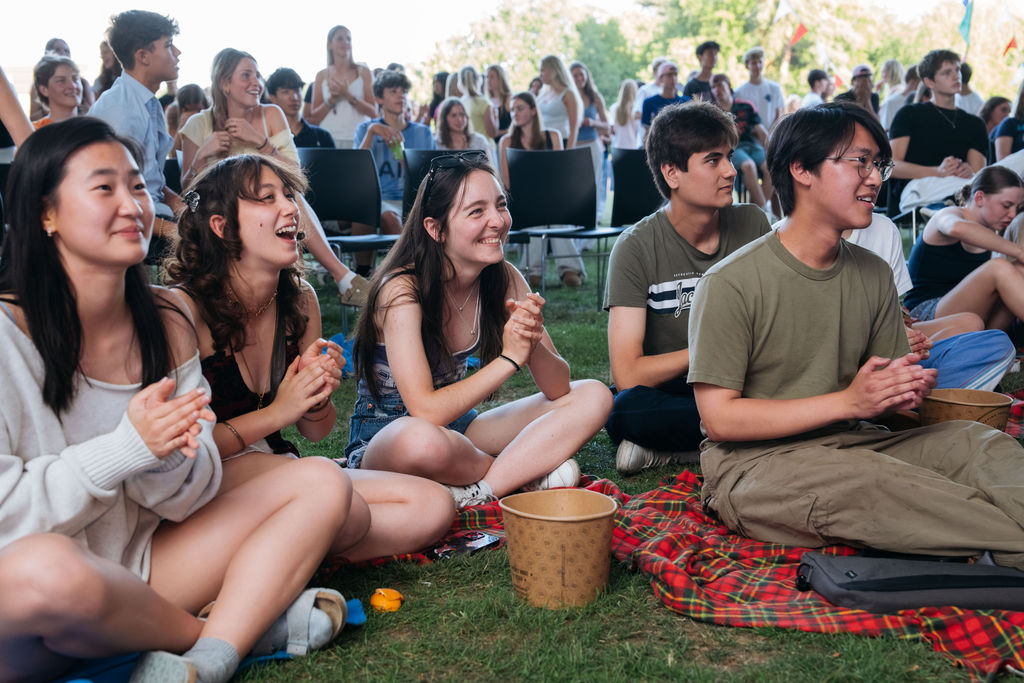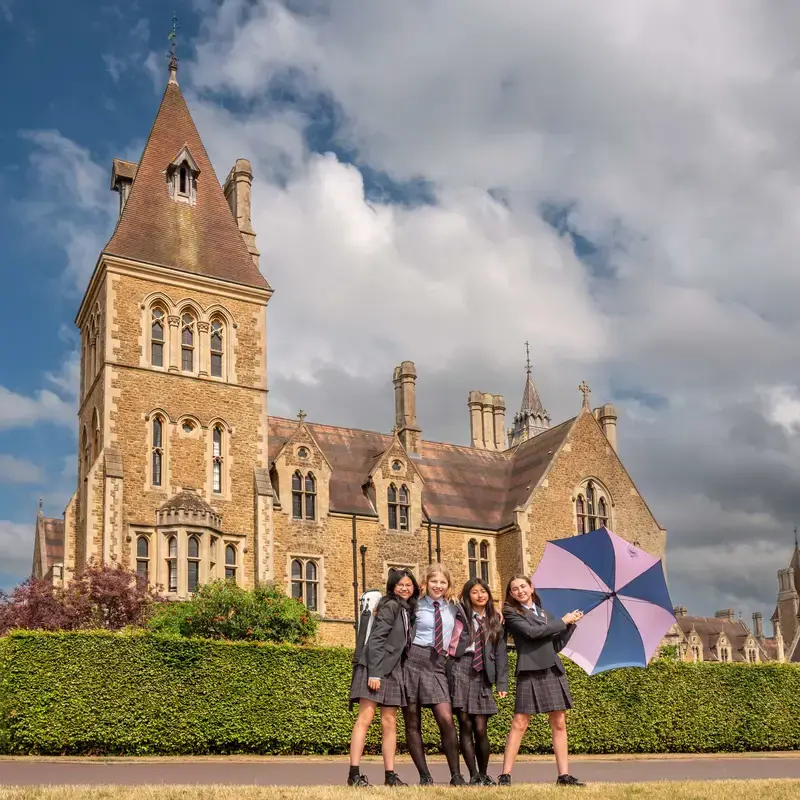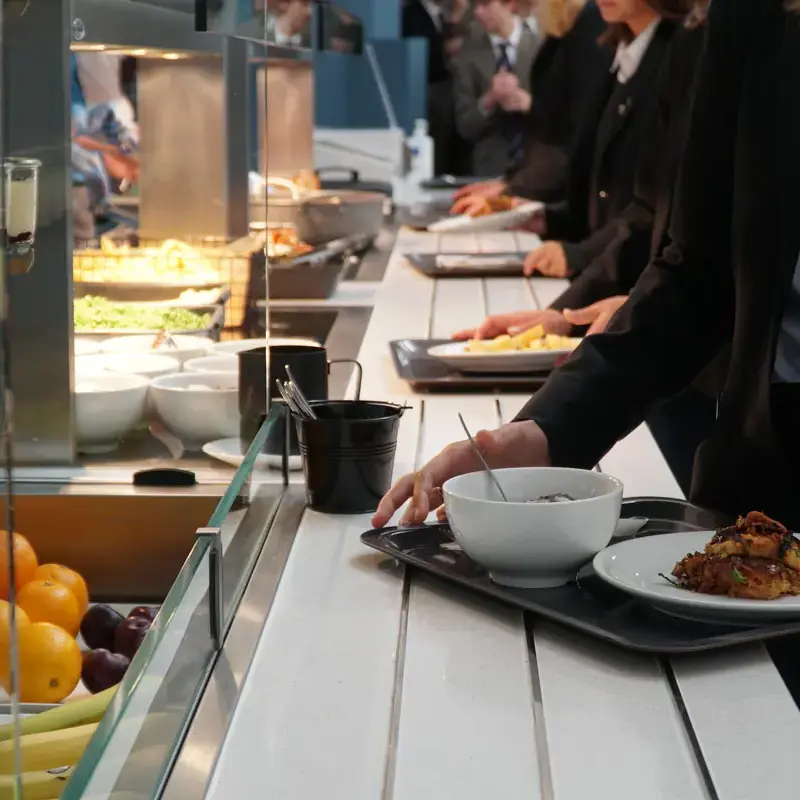Advice for our International Families
Each September, Charterhouse becomes home to over 1,000 children arriving at the School from all around the world. We are especially aware of how significant this move is for our international families.
Staff throughout the School are here to support each child as well as their parents and guardians, every step of the way.
We know that choosing a school overseas is a momentous decision for families. That’s why our support for international pupils begins long before you arrive, and continues every step of the way, through to graduation.
From your very first conversation with us, we’re here to guide and reassure. Whether you’re navigating visa arrangements, planning travel, or simply wondering what to pack, our dedicated staff are on hand to offer advice and help.
Ahead of arrival, families are invited to join our online welcome seminar. This is a chance to meet key members of staff, ask questions, and feel part of the Charterhouse community before term even begins.
Once at School, each pupil is surrounded by a strong circle of care. This includes House staff, personal tutors, and a thriving international pupil committee that ensures every voice is heard. Regular updates from Houses, a clear guardianship structure, and the warmest of welcomes for visiting parents all help international families feel fully involved.
Weekends are active, sociable, and restful, with plenty of opportunity to enjoy time with friends or visit nearby cities.
Meals are nutritious, globally inspired, and freshly prepared on site, with full consideration given to dietary needs.
Above all, we never forget that this is your child’s home from home. Our aim is simple: to offer a rich, caring and structured environment in which every international pupil can flourish.
FAQs for International Families
| What academic support is available for international pupils? |
|---|
|
Departments run weekly subject clinics and teachers are always happy to help 1:1. Each pupil's tutor is also in hand to offer advice. |
| What help is provided for students choosing GCSEs and Sixth Form subjects? |
|
During the Fourth form year (Year 9), pupils and parents will discuss GCSE subject choices with their tutor and teachers. In the Fifth Form (Year 11), there is an advice programme offered that considers the impact of choices on university and beyond. The Futures team are always on hand to have more specific conversations regarding university options. |
| How does the school prepare students for university, especially international applications? |
|
Our Futures team lead a programme that runs through the Sixth Form, which focuses on global university applications. Most pupils apply to top universities in the UK. Applications are discussed in tutorials alongside a series of presentations. Webinars are offered to parents to help them understand the process and any parent is welcome to meet with the Futures team in person or virtually. We have a dedicated member of staff to help with applications to the USA and other parts of the world. In recent years pupils have attended universities across the whole world including the Netherlands and Spain in Europe, Hong Kong and Japan in Asia, Australia and South America. |
| What are the visa and guardianship requirements? |
|
All pupils must have a guardian assigned to them at all times. For those requiring student visas, additional support and information is provided via our dedicated staff within the Admissions team. |
| What do you do at weekends and holidays? |
|
There is an ongoing and vibrant programme of weekend activities for all boarding pupils, which focuses on balancing rest, connection with friends and family online, and engaging activities that support physical, emotional, and social well-being. Charterhouse will remain open for all five Leave Weekends, allowing overseas pupils the option to stay at School. Leave Weekends are short break in the (Quarter) term, usually beginning on Friday afternoon and running through to Sunday evening. This means pupils no longer need to leave campus if they prefer to remain in their familiar boarding environment. |
| How does the school support pupils who have English as an additional language (EAL)? |
|
Our dedicated EAL teachers offer one-to-one or small group help with English |
| How does the school support pupils with additional learning needs? |
|
Led by our experienced Head of Educational Support (SENCo) and specialist SEN teachers, we provide expert, personalised guidance in a supportive and inclusive environment. We provide tailored one-to-one and small-group sessions for pupils with Specific Learning Difficulties and other individual needs. These lessons are timetabled and focused on building practical strategies—from executive function and revision skills to planning, organisation, and exam preparation. |
| How does the school keep us informed of our child’s academic progress? |
|
All pupils have a tutor who is the first point of contact for academic matters. Tutors will contact parents regularly to keep parents updated. There are several reporting cycles during the year. Some of these will be shorter reports with grades that provide a snapshot of progress. Longer reports are written every term, except when we have parent-teacher meetings (held online), where there is the chance to meet and chat with the teachers. This information can also be shared with your child's Guardian, if this would be helpful. |
| What are the pastoral care and wellbeing provisions? |
|
Each of our 15 Houses has three resident members of staff who oversee the pastoral care of pupils. It is also the role of the tutor to help with pastoral care. There is always a member of staff on duty during the day in the House and two in the evenings. We also have a Wellbeing centre where pupils can seek out additional help from the school counsellors. |
| How does the school handle homesickness? |
|
Each House team is very experienced at dealing with homesickness. It is often helpful to talk through the feelings, to help realise that it is quite common and a normal response. Talking to an older pupil in the House who went through the same can help, as they can relate to how the younger person feels. It is important that there is clear communication between the pupil's family and the School, so that we can work together. |
| What are the boarding facilities like? |
|
We have 15 Houses, each with its own character. On one side of the campus, we have our four ‘old houses’ that have been here since the school moved to Godalming in 1872. Opposite, we have a range of Houses built in the 19070s, 1990s and two that were completed just a few years ago. Each is designed to be a home from home where pupils can mix relaxation with work and socialising. Whichever House a pupil is in is always the best House! |
| What if my child does not like the food or has special dietary requirements? |
|
We understand the importance of healthy eating, and also that pupils' tastes vary enormously, especially those that come to us from overseas. There is a great deal of choice available at every meal, and cuisines from around the world are regularly featured. All food is prepared onsite by our team of chefs. If a child has particular dietary requirements, these will be accommodated and can be discussed with our chefs and in-house nutritionist. |
| How often can we communicate with our child? |
|
Many parents will speak to their child every day. Pupils have access to their phones in the morning and evening and often use that time to phone home. If a parent needs to speak to their child at a different time, the House office can be used, and the pupil will be given privacy. |
| What are the School’s safety and security measures? |
|
There are clear areas of our campus where pupils can and cannot go during the day and at night. Our campus is well lit during the darker months, and there are always staff around when pupils move around campus. The school has 24-hour coverage by our own security team. |
| What medical care is available on-site? |
|
Our experienced medical team is available throughout the week to support our pupils’ physical and emotional health. Whether for short-term illness, ongoing care, or health advice, pupils are looked after with discretion, compassion and professionalism. Services include:
|
| How does the School celebrate and respect cultural diversity? |
|
The School is made up of pupils from over 40 countries. This rich diversity is celebrated in many ways every day. It could be through house talks, chapel presentations, celebrating Chinese New Year or Divali. The school’s award winning We Belong campaign is designed to make every pupil from every background feel that they belong to our vibrant and diverse community. It is at the heart of everything the School does. |
| My child is not Christian and follows their own faith. What allowances are made for this? |
|
All pupils attend regular Chapel, where the messaging covers all faiths. For pupils of different faiths, we have a multi-faith prayer and reflection space for daily use. The School also invites faith leaders from the local area to attend and offers the chance for pupils to celebrate important dates in their faith’s calendar. |
| What co-curricular activities are available? |
|
The most important element of a Charterhouse education is our 'Try Everything' culture. We pride ourselves on the broad range of activities available across sport, music, drama, art, outdoor education, clubs and societies and academic super-curricular activities. All of our pupils are encouraged to celebrate and share in their religious and cultural events throughout the year. A number of our pupil-led committees and societies support this. There is something for everyone, and if we are not doing it, we want to hear from the pupils so that we can set it up. Pupils are encouraged to give everything a go. |
Here to help
A dedicated member of senior staff is available to support all of our international pupils and their families.







